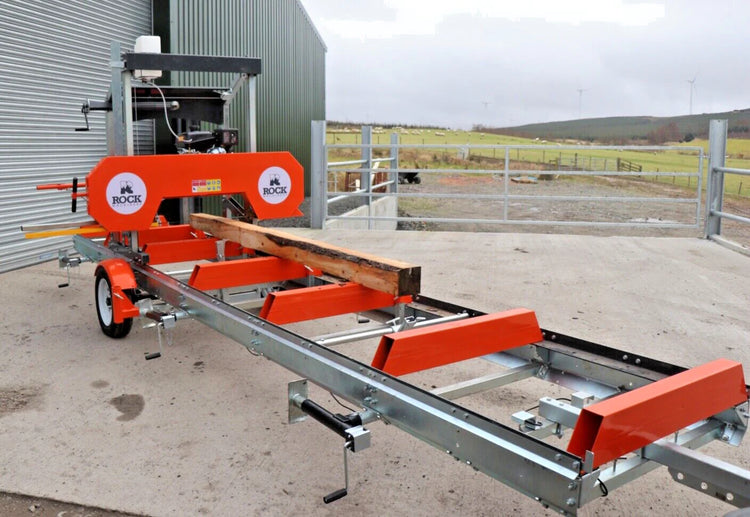The term sawmill refers to both the place where timber is produced and the piece of equipment used to cut wood. As a business that requires sawmill services or a sawmill, you may want to learn more about the different types of saw mills and everything else you need to know.
At Rock Machinery, we stock quality sawmills to help you produce timber efficiently and safely. As well as saw benches, mini chippers, petrol wood splitters and mini excavators, sawmills are great pieces of equipment that can help you increase revenue for your business and make log production much more efficient.
To learn more about sawmills, keep reading this blog.
What is a sawmill?
As mentioned above, sawmill refers to two concepts within the industry. The first is the location where people mill lumber, such as the land on which the sawmill sits. This is usually a timber yard with milling machinery and an area where planks are stored and sorted. A sawmill also has areas on-site for the mill’s administration and maintenance.
Saw mills also refer to the specific machine used to cut or saw wood. The machine turns logs into rectangular timbers for use in various applications. The sawmill industry calls the core sawing machinery a head rig, which requires an extensive support structure to function correctly. The most accurate definition of a sawmill is the entire system that turns logs into lumber.
Sawmills are typically large commercial enterprises with high productivity. Many sawmills employ hundreds of workers and schedule rotating shifts around the clock to keep lumber production efficient.
What do sawmills produce?
Saw mill machinery can help us produce various timber and lumber products for various projects. These include:
Timbers are large-cut posts used in construction and typically measure over 5 inches thick and offer essential structural support. You will find construction companies use timbers as beams or posts when building houses or barns.
One of the most common products to come from a sawmill is dimensional lumber. These wooden planks are smaller than timbers and are measured by standardised sizes. For example, dimensional lumber can be between 2-5 inches thick and 2-12 inches wide. You may be aware of the standard two-by-four size dimensional lumber as well as four-by-fours. These lumbers are used in construction and manufacturing applications for joists, studs, headers, plates and rafters.
Sawmills can also plane dimensional lumber to a specific size and smoothness. It can be tricky to create these as planing the wood reduces its size slightly. A rough-cut plank coming from the head rig is precisely 2 inches thick and 4 inches wide. Although, the actual dimensions of a 2x4 after the sawmill planing are 1 ½ inches thick by 3 ½ inches wide.
Boards are also created using sawmills. They are thin planks that typically measure between ¾ of an inch and 1 inch thick. Boards can range from 2-12 inches in width. Companies use boards to create sheathing structures, plank floors and frames for furniture.
Sawmills also create wooden planks with specialised shapes and contours as well as interlocking tongue and groove shapes, shiplap edges and rounded profiles. These kinds of planks are used in decorating and architecture.
What is a portable sawmill?
Portable sawmills offer a relatively low-cost entry into sawmilling. They are suited well to processing alternative species grown in woodlots and small plantations. Some portable sawmills can be towed to the site while others can be broken down for transport on a trailer. You can easily set up a sawmill on a farm or in the forest in less than an hour. You can find larger commercial models for semi-permanent on-site use and you’ll need a loader, forklift or farm tractor to move, stack and load out logs and timber.
What are the advantages of portable sawmills?
There are many reasons why portable sawmills are great, here are a few advantages:
- Portable sawmills have low purchase and running costs in comparison to other wood processing options. So you can easily start up your own sawmill without too many upfront costs.
- Portable sawmills are able to cut a large variety of timber sizes and species, making them a very versatile piece of equipment.
- They enable you to get maximum value from different types of logs.
- You can economically saw high-value logs on-site rather than having to transport them to another site. As a result, this can reduce transport costs and cutting logs into timber means only half the volume of wood needs to be loaded and trucked for further timber processing or sale.
- When stacked for storage or drying on the farm or in the forest, the costs can be much lower. Some alternative species are naturally durable and store well without the risk of decay for months or even years.
- Portable sawmills also have low environmental effects and a very small environmental footprint in comparison to other wood processing options.
- Portable sawmills are great for occupations such as farming as they allow you to create an extra stream of revenue during seasonal lows.
- You can increase production at any time by buying another portable sawmill.
What are industrial sawmills?
Industrial sawmills refer to stationary sawmill locations and are often built near water sources. During the Industrial Revolution, sawmills were powered by steam which required a stable and renewable source of water for production. It is more practical for the mill to be located by a waterway so that employees can use the water to transport logs to and from the mill. This is also convenient because it prevents them from drying out prematurely.
In the modern day, sawmills don’t use steam, yet they remain in the same location. So they have still managed to evolve while remaining next to water. In contrast to industrial sawmills, portable sawmills don’t require a source of water or a specific amount of land. This enables operators to move the sawmills between sites, whereas industrial sawmills are only in one location where the logs will need to be transported.
Sawmills can also be categorised by the type of blade they use. Most sawmills now use both circular blades and band saws. Circular blades can efficiently perform cross-cuts or buckle logs into the desired length. They are also thicker than band saws which gives them added strength. Their design means the kerf saw creates more waste. Band saws are great for cutting logs laterally. This is because band saw blades are thinner with thinner kerfs. These blades increase sawmill efficiency by creating less waste during the wood-finishing process.
RSM-79T Trailer Mounted Saw Mill From Rock Machinery
At Rock Machinery, we stock the RSM-70T Trailer Mounted Saw Mill which is a robust and capable sawmill with a max cutting length of 4 metres and a max diameter of 88cm, so it’s perfect for home use. The model is mounted to a 600c, long heavy-duty trailer to make transportation easy around your farm or garden. This sawmill is easy to use and ergonomic.
You can put your lengths of wood into the sawing platform, lock it in place with the log hooks and then set your cutting height. Simply push the upper body of the machine and the blade will cut through the length of wood to produce perfect planks of wood. You can also benefit from safety features including an emergency stop and blade cover for when the sawmill is not in use. You can control the revs and blade cooling from a hand throttle on the operator's hand grip on the side of the machine.
Rock Machinery - Sawmills, Saw Benches & Mini Chippers
Are you looking for a range of high-quality log-splitting machinery? At Rock Machinery, we stock a range of products to make your home or business more efficient. No matter what the tasks at hand, our machinery will take the load off. Take a look at our website today to browse petrol wood splitters, mini excavators or other log-splitting machinery

